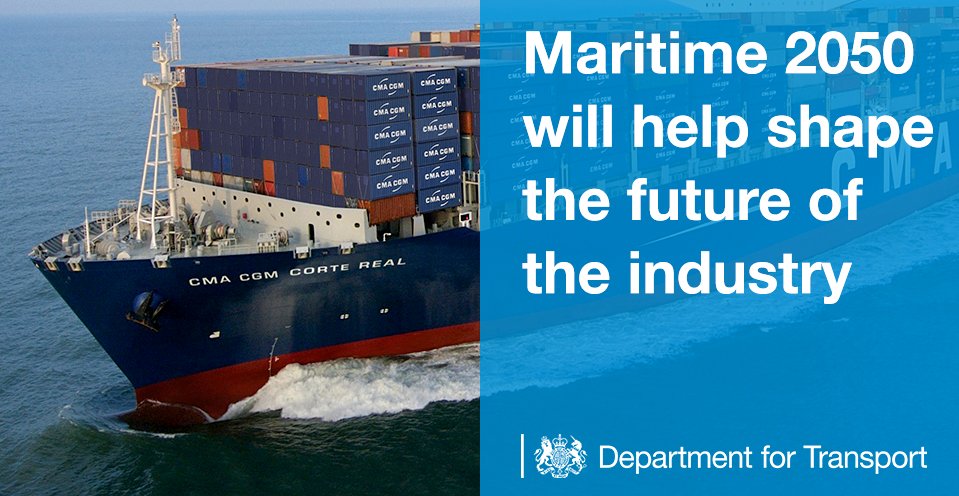|
CLEAN MARITIME PLAN 2050
Please use our A-Z INDEX to navigate this site or return HOME
|
|
Chris Grayling and Nus Ghani
The world’s proudest maritime heritage, as a global leader for the 21st century
1. In January 2019 the government published Maritime 2050 [1], a strategic vision for the future of the maritime sector building on the earlier 2015 Maritime Growth Study [2], outlining ambitious recommendations to take the UK maritime industry into the second half of the 21st century. Underpinning the Maritime 2050 strategy are 10 core strategic ambitions, covering a range of topics from competitiveness to technology. These include the intention that the UK ‘lead the way in taking action on clean maritime growth, enjoying economic benefits from being an early adopter or fast mover.’
2. Building on this strategic ambition, Maritime
2050 sets a vision for clean maritime in the UK as follows:
3. The Clean Maritime Plan is the Environment Route Map of Maritime 2050, setting out in more detail how Government sees the UK’s transition to a future of zero emission shipping [3]. It encompasses the maritime commitments within the Clean Air Strategy [4] to ensure that the sector takes the steps necessary to protect human health and the environment from air quality pollutants. At the same time, it recognises the need for all countries to take action to address emissions of greenhouse gases, in line with the Paris Agreement and its temperature goals [5]. In 2018 the UK was a leading voice in the agreement of the Initial IMO Strategy on the Reduction of GHG from Ships (‘the IMO GHG Strategy’) [6].
The Strategy commits the maritime sector globally to reducing emissions of GHGs from shipping by at least 50% by 2050 compared to 2008, while pursuing efforts to phase them out. While the UK continues to believe that global action is the most effective way to achieve these ambitions, it also recognises the role that national action can play in leading the transition to zero emission shipping. In this context, the Clean Maritime Plan represents the UK’s National Action Plan on shipping emissions.
4. But above all, the Clean Maritime Plan is about opportunity. For example, research commissioned by the Government estimates that the economic benefits to the UK across 11 key maritime emission reduction options could reach $650-890 million per year by the middle of the century [7]. In line with the Government’s vision for sustainable economic growth as set out in the Clean Growth Strategy [8] and Industrial Strategy [9], the Clean Maritime Plan seeks to support the innovation already present in British manufacturing, technology, fuel production and services, encouraging the translation of this expertise to the potential new clean maritime market.
5. In order to realise the full potential of this clean growth opportunity a collaborative approach from industry and Government is vital. The Clean Maritime Plan has been developed in close partnership with the maritime industry. This has included an extensive programme of stakeholder engagement, including the establishment of a Clean Maritime Council, alongside workshops and ongoing dialogue. The Council is a strategic advisory body, bringing together leading figures from the maritime industry, academia and Government [10]. The Clean Maritime Plan has also been informed by a programme of economic and technical research, available online [11].
6. This process of consultation and research has indicated that we are on the cusp of a global transition to zero emission shipping. To reach significant reductions of greenhouse gases and air quality pollutants, energy efficiency technologies will not be sufficient. Low or zero-emission fuels and propulsion technologies will be necessary. Many other countries are demonstrating a keen interest in the development and implementation of such green shipping innovations and are moving swiftly to demonstrate leadership in this field. Maritime 2050 sets out the UK’s ambition on this front, while the Clean Maritime Plan sets out a route map for domestic action to respond to this opportunity. It will help ensure that the UK builds on its unique maritime heritage to remain a world leading maritime economy.
Clean Maritime Plan Ambitions
7. It is Government’s intention to support a high level of ambition on emissions reduction, providing enough direction to give investment certainty while allowing industry the space to innovate. To assist in providing this certainty, and in line with the recommendations set out in Maritime 2050, we have set out Clean Maritime Plan Ambitions for the UK maritime sector. A significant increase in technology commercialisation and uptake will be necessary by 2025 and 2035 to make it possible to reach zero emission shipping by the latter half of the century. As such, ambitions are articulated for each of these dates, highlighting the expected direction of travel.
8. These zero emissions shipping ambitions are intended to provide aspirational goals for the sector, not mandatory targets. They can only be achieved through collaboration between Government and industry, promoting the zero emission pathways that maximise the economic opportunities for the UK economy while also minimising costs for UK shipping.
Ambitions
9. In Maritime 2050, the Government set out its vision for the future of zero emission shipping:
“In 2050, zero emission ships are
commonplace globally. The UK has taken a proactive role in driving the transition to zero
emission shipping in UK waters and is seen globally as a role model in this field, moving faster
than other countries and faster than international standards. As a result,
the UK has successfully captured a significant share of the economic, environmental and health benefits
associated with this transition.”
i. All vessels operating in UK waters are maximising the use of energy efficiency options. All new vessels being ordered for use in UK waters are being designed with zero emission propulsion capability. Zero emission commercial vessels are in operation in UK waters.
ii. The UK is building clean maritime clusters focused on innovation and infrastructure associated with zero emission propulsion technologies, including bunkering of low or zero emission fuel.
iv. The UK Ship Register is known as a global leader in clean shipping and the UK is home to a world-leading zero emissions maritime sector, with:
a. a strong UK export industry
11. The following are the Government’s key policy commitments from the Clean Maritime Plan. These aim to support the sector as it moves towards the vision set out in Maritime 2050, and the Clean Maritime Plan Ambitions.
2. Government will consult in 2020 on how the Renewable Transport Fuel Obligation could be used to encourage the uptake of low carbon fuels in maritime.
3. Government will launch a ‘Greening Finance/Financing Green’ for Maritime Initiative at London International Shipping Week 2019.
4. In conjunction with a working group as part of the Clean Maritime Council, Government will undertake a study to identify and support potential UK zero emission shipping clusters.
5. Government will support clean maritime innovation in the UK, beginning with:
6. The Government will establish the Maritime Emissions Regulation Advisory Service (MERAS) by 2020. Supported by the Maritime and Coastguard Agency, MERAS will provide dedicated support to innovators using zero emission propulsion technologies, assisting them through the regulatory process.
12. To help oversee the implementation of
these policy commitments in the short-term, the Clean Maritime Council will
continue as a strategic advisory body. The Government will publish a review of
INTRODUCTION: 1 - 13
SECTION 1 - TACKLING EMISSIONS:
14
- 50
The
Knowledge Transfer Network is Innovate UK’s network partner, and also provides innovation networking for other funders in line with its mission to drive UK growth.
LINKS & REFERENCE
https://
Please use our A-Z INDEX to navigate this site
|
|
|
This website is Copyright © 2021 Jameson Hunter Ltd
|


